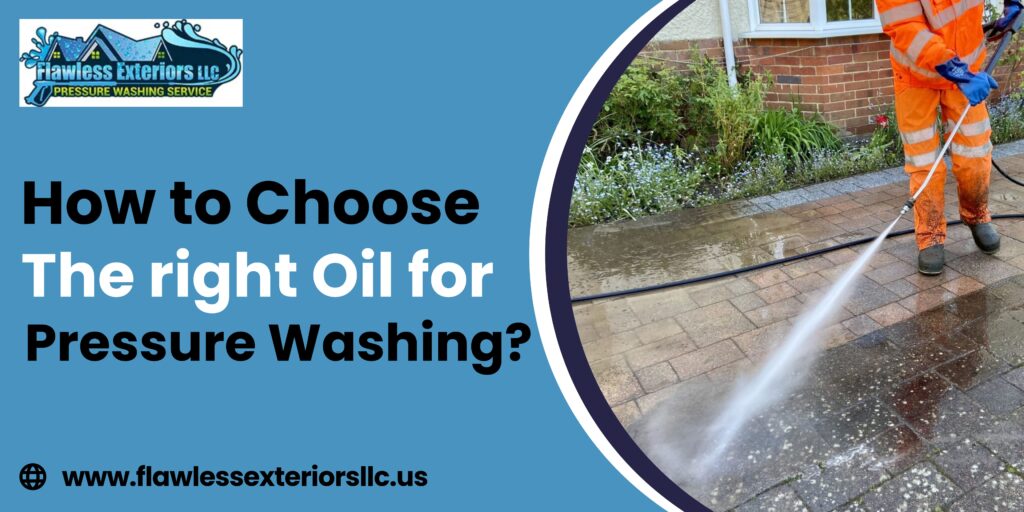- +1 (980) 699-6467
- info@flawlessexteriorsllc.us
- Mon - Fri: 9:00 - 18:30

Choosing the correct pressure washing oil is necessary for optimal performance and longevity of the machine. The right oil ensures smooth engine operation, minimizes wear on internal components, and extends the life of your pressure washer. But with different oil types available, selecting the best one can seem confusing. Don’t worry, our Flawless Exteriors LLC experts will help you to navigate the options and choose the perfect oil for your pressure washer.
What is Pressure Washer Oil?
Pressure washer oil is specifically formulated for the high pressures and temperatures generated by the pump, unlike regular motor oil. This specialized oil plays a vital role:
- Reduces friction and heat: It acts as a lubricant, minimizing friction within the engine and pump, preventing early wear and tear.
- Maintains viscosity: Effective lubrication across a wide temperature range ensures consistent performance even under demanding use.
- Protects from corrosion: Additives in the oil shield the pump from internal damage, extending its lifespan.
- Material compatibility: The oil is formulated to work safely with common pressure washer pump materials like brass, aluminum, and steel.
Engine Oil vs. Pump Oil
Pressure washers typically require two types of oil:
- Engine Oil: Lubricates the engine itself. Refer to your owner’s manual for the recommended viscosity grade based on operating temperatures.
- Pump Oil: Specifically designed for the high-pressure pump. It’s usually non-detergent to avoid foaming issues.
Understanding Oil Types: Choosing the Right One
Here are some key factors to consider when selecting the right oil for your pressure washer:
- Manufacturer Recommendations: Your owner’s manual provides the most reliable guidance on oil type and viscosity for both engine and pump. This is the most important factor to consider, as using the wrong oil can damage your pressure washer.
- Temperature Conditions: Select oil viscosity based on the prevailing temperatures in your area. Engine oil viscosity is typically denoted by two numbers (e.g., 10W-30), indicating its performance at low and high temperatures.
- Synthetic vs. Mineral Oil: Some pumps might require synthetic oil for optimal performance and longevity. Consult your owner’s manual for specific recommendations.
Benefits of Using the Right Oil
Using the correct pressure washer oil extends the lifespan of your machine, saving you money on repairs and replacements in the long run. It also ensures:
For those in Charlotte looking to avoid the hassle of oil selection and maintenance, reputable pressure washing services in charlotte like Flawless Exteriors LLC could be a great option. They’ll have the expertise and equipment to tackle any cleaning project, ensuring a spotless finish.
- Optimal performance: Proper lubrication minimizes friction and heat, allowing your pressure washer to operate efficiently.
- Reduced wear and tear: The oil protects internal components, minimizing wear and tear caused by friction.
- Prevention of costly repairs: Regular oil changes and using the right type of oil help prevent premature pump failure and costly repairs.
Maintaining Your Pressure Washer
For a pressure washer running smoothly and efficiently, refer to your owner’s manual for specific oil recommendations or consult a pressure washer professional. Remember, following a regular oil change schedule is essential for optimal performance and longevity.
By following these tips, you can choose the right oil for your pressure washer and ensure it operates at peak performance for years to come.
Tips & Factors for Choosing the Right Oil:
Choosing the best oil for pressure washing is very dependent on factors.
- Refer to the pressure washer’s owner’s manual for specific oil recommendations. In fact, engine oil and pump oil requirements will depend on the manufacturer and model.
- Select oil grades and viscosity levels suitable for the prevailing temperature conditions. In fact, engine oil viscosity typically depends on two numbers (e.g., 10W-30), representing its viscosity at low and high temperatures.
- Ensure that the pump oil is compatible with the pressure washer pump materials. Some pumps may require synthetic pump oil for optimal performance and longevity.
So, using the correct type and grade of oil is essential for maintaining the pump’s performance, efficiency, and longevity. Regular inspection and replacement of the oil according to the manufacturer’s guidelines help ensure optimal operation and prevent premature wear and failure of the pressure washer pump. However, Flawless Exteriors LLC also has experts who can recommend them as on their experience.
Safety Precautions and Best Practices:
Always follow the manufacturer’s guidelines and specifications for oil type, capacity, and change intervals. Use caution when handling hot oil and engine components to avoid burns or injuries. Dispose of old oil properly by recycling it at designated collection points or facilities. Clean up any spills or leaks immediately to prevent slips, falls, or environmental contamination. Keep children and pets away from the work area during the oil change process. By following these steps and safety precautions, you can perform a thorough oil change on your pressure washer, ensuring optimal performance and longevity.
Conclusion:
Always check your pressure washer’s manual for the right oil type, amount, and how often to change it. Pressure Washing Safety should be your first priority ! Be careful when handling hot oil and engine parts to avoid getting burned. Recycle your used oil properly at designated spots. Clean up any spills right away to avoid slips or hurting the environment. Keep kids and pets away from the area while you change the oil. By following these simple steps, you’ll keep your pressure washer running great for a long time.
